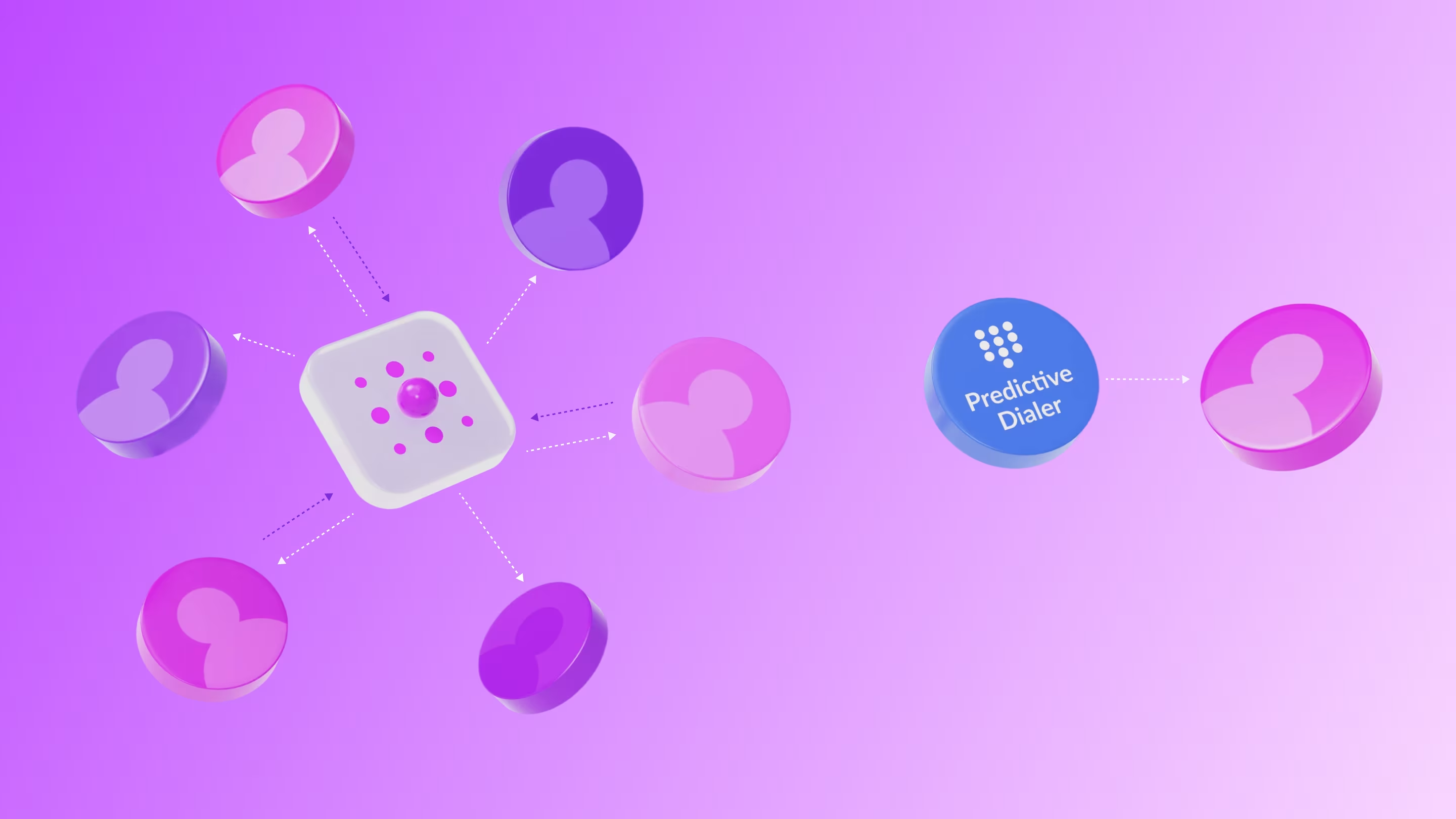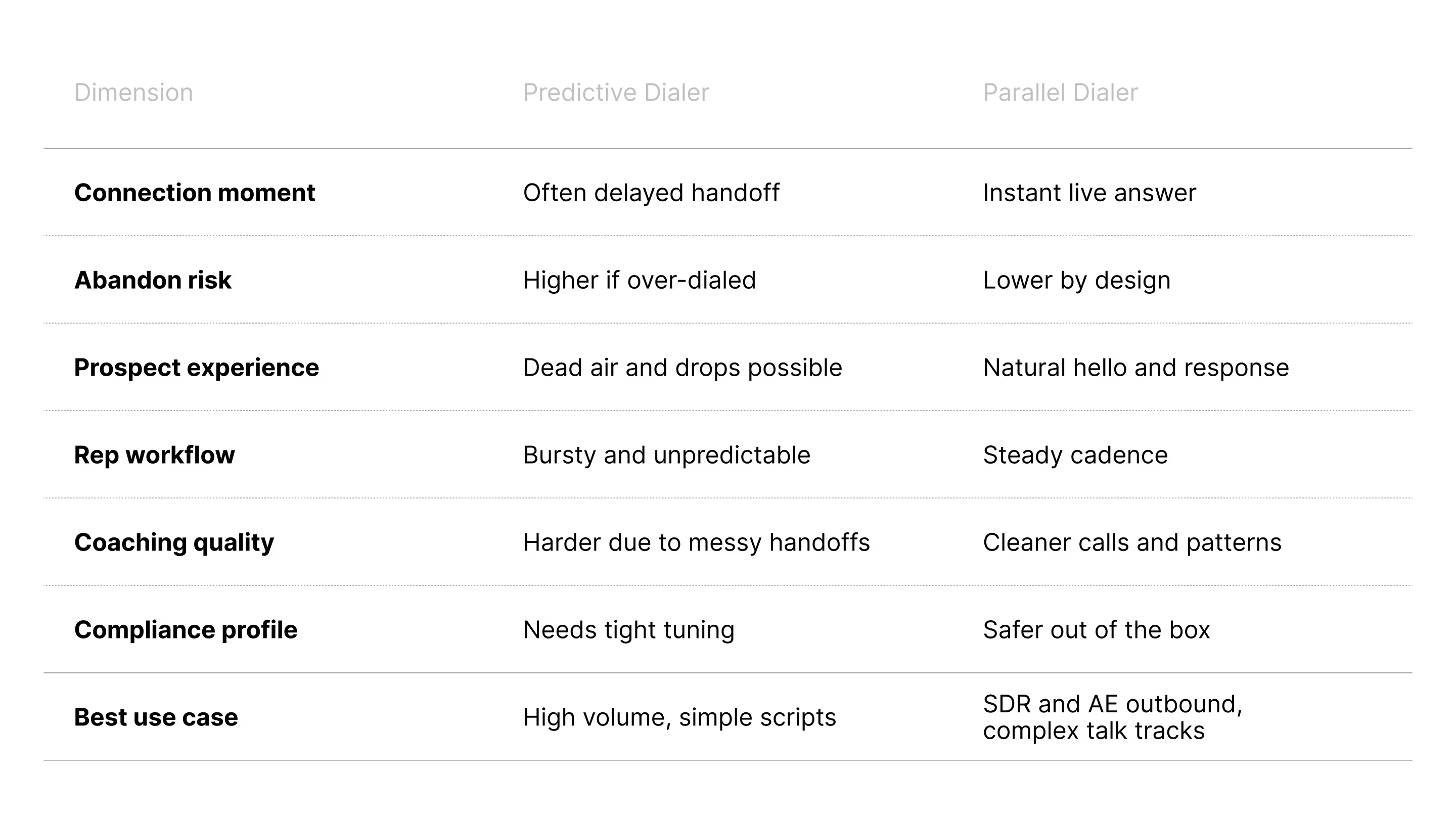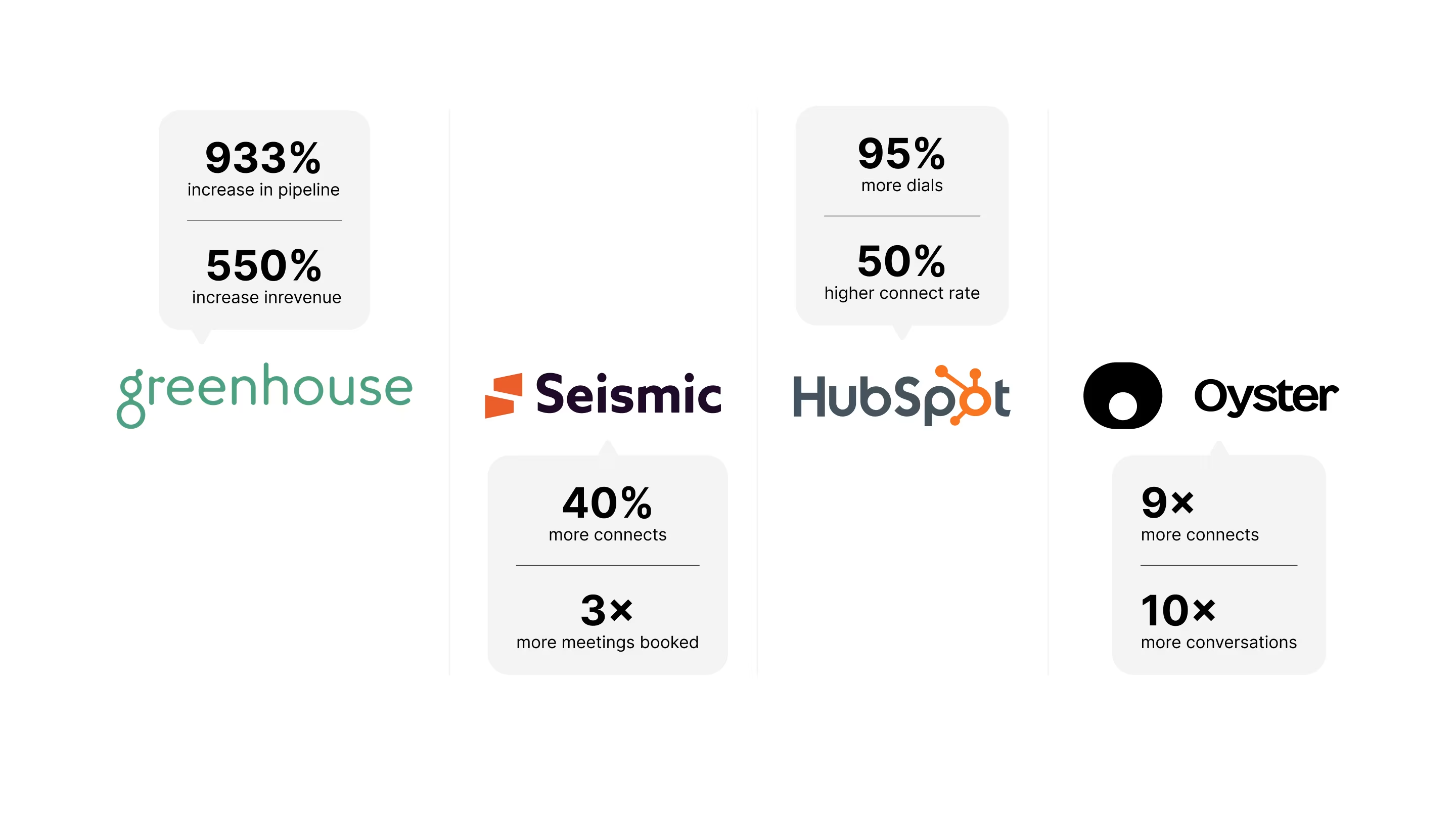Parallel vs Predictive Dialer: Speed With Quality

Why this comparison matters
Outbound lives or dies on live conversations.
Power dialers raised activity. Predictive dialers chased “speed.” Both helped, but neither solved the real bottleneck. Reps still spend too much time waiting for the next human voice.
Parallel dialing took a different path. Instead of predicting when a rep is free, it ensures there is always a live rep ready and prepared to sell when a prospect answers. That simple shift produces more conversations per hour, cleaner experiences for prospects, and a healthier pipeline.
This piece breaks down the difference in plain terms, shows where predictive breaks, and explains why modern teams standardize on parallel dialing with AI assistance.
Quick definitions
Predictive dialer
Software that tries to forecast when agents will be free, then dials ahead of that moment to keep them busy. The system guesses. If it guesses wrong, prospects hear dead air or get dropped. That can create compliance issues and hurts trust.
Parallel dialer
Software that dials several numbers at once and routes the first live answer to the rep in real time. There is no guessing. No dead air. Fewer abandoned calls. More live conversations per hour.
Where predictive dialers struggle
Predictive dialers were built for high volume contact centers and simple talk tracks. Sales development is different. You need clean handoffs, no delays, and context from the first second. Predictive systems often stumble here:
- Dead air and call drops
The system connects late or over-dials. Prospects say hello and hear silence. Many hang up instantly. - Abandon rate risk
Over-aggressive pacing inflates abandoned calls. That invites regulatory risk and damages brand trust. - Inconsistent rep experience
Reps get flooded one minute and idle the next. Coaching and quality control suffer. - CRM gaps
Legacy predictive stacks often feel separate from the SDR workflow. Data hygiene drops. Leaders lose visibility.
How parallel dialers avoid those downsides
Parallel dialing flips the logic. It makes sure the rep only hears a human. Anything else never reaches them.
- Instant human connection
Several numbers ring. The first live answer routes to the rep immediately. - Natural pacing
No forecasting required. Reps get a steady flow of conversations rather than big spikes and dead zones. - Great prospect experience
No awkward delays. The rep speaks first, with context, scripts, and other data, and keeps control of the call. - Cleaner compliance profile
Lower abandon rates, proper pacing, and time zone controls reduce risk.

Side by side: predictive vs parallel

A predictive dialer tries to keep seats busy.
A parallel dialer keeps humans talking.
AI is the force multiplier
Parallel dialing sets the table. AI makes the meal.
The biggest gains come when you combine parallel dialing with AI for:
- Targeting and timing
Call the right people first. Nooks AI Prospector boosts connect rates by feeding contacts who show live intent signals such as website visits, research on previous deals and conversations, and LinkedIn engagement. - Live coaching
Improve conversation quality in the moment. Nooks AI Coach surfaces talk tracks that convert and flags objections as they happen. - Number reputation and local presence
Rotate numbers, avoid spam, and present local area codes automatically. AI keeps lines healthy so answer rates stay high. - Workflow hygiene
Sync calls, notes, and outcomes to your CRM without extra steps. Data is clean. Coaching gets easier. Forecasts get sharper.
Metrics that highlight the difference
Track these dialing metrics weekly to see where predictive stalls and parallel shines:
- Connect rate
Conversations divided by dials. Parallel dialing lifts this immediately by eliminating idle rings and voicemail waste. - Conversation to meeting rate
Meetings divided by live connects. Clean handoffs and live coaching raise this faster than any activity boost. - Meetings per rep per day
The simple output stat. Parallel is the shortest path from activity to booked time. - Ramp time
Weeks to full productivity. With steady call flow and live coaching, new reps become effective much faster. - Number reputation
Spam labels and answer rate by number. Parallel programs that automate rotation and local presence win here.
Real outcomes from customers
Teams that moved from legacy stacks to Nooks’ AI Parallel Dialer report step changes in output:
- Greenhouse grew pipeline 933 percent and revenue 550 percent.
- Modern Health achieved 5 times more dials and a 50 percent lift in meetings.
- HubSpot saw 95 percent more dials and a 50 percent higher connect rate.
- Seismic reduced ramp time 40 percent and tripled meetings.
- Oyster hit 9 times more connects and 10 times more conversations per rep.
“Before Nooks, a lot of effort never reached a live person. Now every hour includes real conversations,” said one enterprise SDR leader.

Global scale and compliance
Parallel dialing only works at scale if it respects local rules.
Nooks manages local presence by region, rotates numbers to keep labels clean, enforces time zone and DNC guardrails, and tracks pacing to keep abandon rates low. Enterprise teams can run the phone channel at high velocity without risking brand reputation.
How to switch from predictive to parallel
A clean migration plan:
- Baseline your metrics
Capture connect rate, meeting rate, and meetings per rep for four weeks. - Start with a pilot team
Pick a pod with mixed tenure. Keep sequences and targeting steady to isolate the dialer effect. - Tune multi-line settings
Start conservative. Increase lines gradually while monitoring experience and abandon rate. - Bring signals into the queue
Prioritize the warmest contacts. Time calls around known pickup windows. - Coach live for two weeks
Use AI Coach to install the best openers and objection handling. Review the top 10 calls every Friday. - Measure again at week four
Expect higher connect rates, higher meeting rates, and more meetings per rep with fewer complaints from prospects.
FAQs: Parallel vs Predictive Dialer
1) Why do predictive dialers create dead air
They forecast agent availability. If the timing is off, the system connects late. Prospects hear silence and hang up.
2) Does parallel dialing remove abandon risk
It reduces it sharply. Because only live answers reach reps, you avoid most drop scenarios that inflate abandon rate.
3) How many lines should I run in parallel
Start with a low multi-line setting and increase as you monitor experience and pacing. Aim for stable connects and clean conversations.
4) Will local presence really lift answer rates
Yes. Familiar area codes improve pickup. Nooks automates local presence and monitors number reputation.
5) Can parallel dialing work for international teams
Yes. With time zone controls, pacing, and DNC enforcement, global teams run safely at scale.
6) What if my connect rate is still low after switching
Check number reputation, list quality, call windows, and whether you are prioritizing buyer signals.
7) Do I still need coaching if I adopt AI
Yes. AI improves coaching by surfacing patterns and giving real time feedback. Managers still shape message and skill.
8) What change should I see in month one
Most teams see 2 to 5 times more connects and 2 to 3 times more meetings with the same headcount.
Conclusion
Predictive dialers chase seat utilization. Parallel dialers maximize human connection.
If your goal is pipeline, pick the model that delivers more clean conversations, better talk tracks, and faster coaching loops.
Nooks brings that modern model to life. AI Parallel Dialer for the connection. AI Prospector for the right targets. AI Coach for live improvement. One workflow that turns dials into meetings and meetings into revenue.
To explore related guides:







